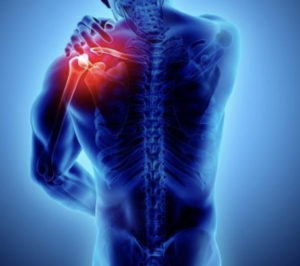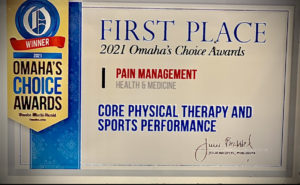CORE Physical Therapy In Omaha Explains…
By Dr. Mark Rathjen PT DPT CSCS
CORE Physical Therapy Co-owner
17660 Wright St. 9/10
Omaha NE
402-933-4027
The. conclusion of the article states “:Musculoskeletal physiotherapy seems to be an effective treatment for patients with shoulder pain although it is still based on weak diagnostic clinical instruments. The adoption of more functional and prognostic assessment strategies is advisable to improve coherence between evaluation and treatment.”
Though not the end all be all, Physical Therapy for shoulder pain is effective, safe and non invasive. We have also learned in other various studies some outcomes are the same with and without surgery vs Physical Therapy for the shoulder. A qualified Dr of Physical Therapy should be able to examine and tell you if there is a need for diagnostics or will rehabilitation suffice.
CORE Physical Therapy in Omaha was designed to cater to the athletic population. We work with patients of all types, sizes and goal sets. Omaha has been served from 2015 to present. We are currently into an expansion plan for the upcoming year as our clinic grows.
C.O.R.E. Physical Therapy and Sports Performance PC,
17660 Wright St, Suites 9/10
Omaha, NE 68130
402-930-4027
At CORE Physical Therapy in Omaha, We specialize in the treatment of athletes. We have worked with athletes for a combined 30 years. CORE was established in 2015 by Dr. Mark and Dr. Claire Rathjen is family owned and operated.
Proud winners of the Omaha Choice awards for 2016, 2017, 2018, 2019, 2020,2021
We are proud to serve the greater Omaha metro area.
For More information, Please feel free to contact us http://coreomaha.com/contact/
Please feel free to follow us at https://www.facebook.com/COREomaha/
To get started http://coreomaha.com/getting-started/
For more Blog information http://coreomaha.com/blog/
Youtube Account linked below.
https://www.youtube.com/channel/UCVg8OSN5h-i1n_ykw1Gvahg?view_as=subscriber
The management of shoulder impingement and related disorders: A systematic review on diagnostic accuracy of physical tests and manual therapy efficacy
- PMID: 31563378
- DOI: 10.1016/j.jbmt.2018.08.002
Abstract
Background: Diagnostic accuracy of physical tests and effectiveness of musculoskeletal rehabilitation of shoulder disorders are still debated.
Objectives: To investigate diagnostic accuracy of physical tests, efficacy of physiotherapy and coherence between target of assessment and intervention for shoulder impingement and related disorders like bursitis, rotator cuff and long head biceps tendinopathy and labral lesions.
Methods: A systematic search of four databases was conducted, including RCTs and cross-sectional studies. Cochrane Risk of Bias and QUADAS-2 were adopted for critical appraisal and a narrative synthesis was undertaken.
Results: 6 RCTs and 2 cross-sectional studies were appraised. Studies presented low to moderate risk of bias. There is a lack of evidence to support the mechanical construct guiding the choice of physical tests for diagnosis of impingement. Manual techniques appear to yield better results than placebo and ultrasounds, but not better than exercise therapy alone. Discrepancy between the goal of assessment strategies and the relative proposed treatments were present together with high heterogeneity in terms of selection of patients, type of endpoints and follow-ups.
Conclusions: Musculoskeletal physiotherapy seems to be an effective treatment for patients with shoulder pain although it is still based on weak diagnostic clinical instruments. The adoption of more functional and prognostic assessment strategies is advisable to improve coherence between evaluation and treatment.
Keywords: Diagnosis; Exercise; Musculoskeletal; Physical test; Rotator cuff; Shoulder.
Copyright © 2018 Elsevier Ltd. All rights reserved.


